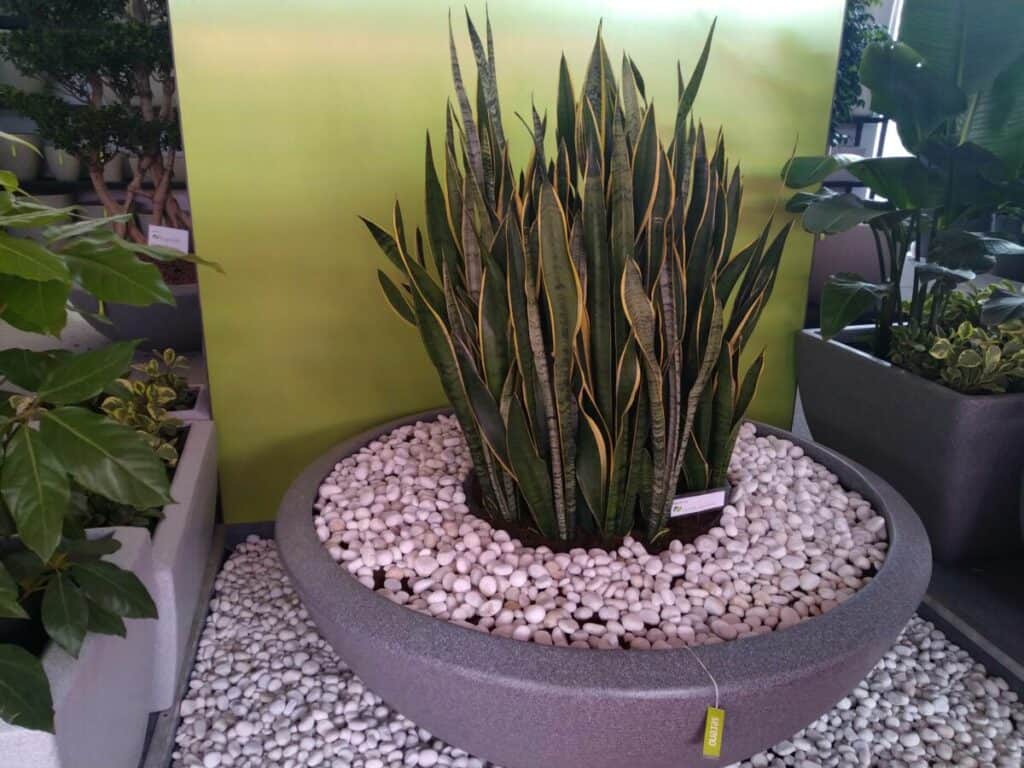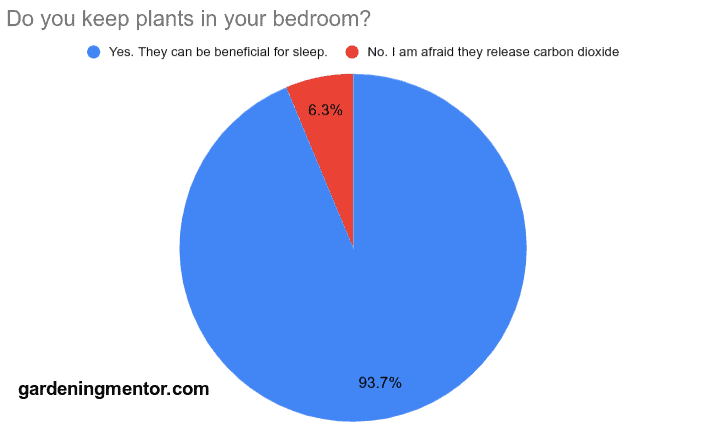Is it true?
Are the plants in your bedroom really bad for you?
It is not bad to sleep with plants in your bedroom and that is an urban myth. They emit carbon dioxide but it’s in small amounts and won’t affect your health. Keeping plants in the bedroom can have a soothing effect, increase oxygen, remove toxic materials from the air.
In fact, the plants in your room can do good for you and help you sleep better. I’ll help you check which plants can do this and which you should avoid.
Let’s get started.
Is it bad to sleep with plants in your room?
There is a common urban myth that sleeping in a room with plants is dangerous and may even cause carbon dioxide poisoning or suffocation. However, this is nothing more than a myth.
The process of respiration boils down to the simple intake of oxygen and expel of carbon dioxide. Many people become nervous when learning that plants respire, thinking that the carbon dioxide produced by their respiration – and the lack of photosynthesis taking in carbon dioxide – will cause suffocation while they sleep.
This is not true when considering the following reasons; how much plants respire and when, along with the effects of carbon dioxide.
I asked fellow gardeners if they keep plants in their bedrooms. A majority 93.7% mentioned that they do keep plants in the bedroom and don’t see any issue with it.
Plant Respiration
All living things respire, humans, animals, and plants alike. There is a common misconception that plants only respire at night, but this is not true. Plants respire throughout the day and the night, just like we do. When they respire, they emit less carbon dioxide than humans do.
The idea of plants only respiring at night might have come from a simple misunderstanding. Everyone knows plants only photosynthesize during the day due to the vital role sunlight plays in the process. It is possible to believe that the only time plants then respire is during the night, but plants are more than capable of photosynthesizing and respiring simultaneously during the day.
It’s perfectly safe to sleep with houseplants in your bedroom. Whilst the vast majority of plants release carbon dioxide by night, they will never produce enough to be harmful, unless you are sleeping in some sort of a jungle! – Leslie Vincent, Gardening Expert & Horticulturalist, Atkins Garden Centre
Although, some people who know that plants respire during the day may be worried about the lack of photosynthesis at night causing a problem. Even when a plant is not taking in carbon dioxide for photosynthesis, it does not mean they respire enough to threaten your health. Due to the amount they photosynthesize during the day, they can take a few hours off at night and still maintain a track record of reducing carbon dioxide levels.
Carbon Dioxide vs. Carbon Monoxide
The idea that sleeping with plants in bedroom at night is dangerous may come from people confusing the two colorless, odorless gases: carbon dioxide and carbon monoxide.
- Carbon Dioxide– Carbon dioxide is one of the gases we expel in the process of respiration.
- Carbon Monoxide – Carbon monoxide is a gas that replaces the oxygen in your bloodstream, leading to tissue damage or death.
| Carbon Dioxide | Carbon Monoxide |
| Carbon dioxide is one of the gases we expel in the process of respiration. | Carbon monoxide is a gas that replaces the oxygen in your bloodstream, leading to tissue damage or death. |
While the threat of carbon monoxide is genuine, carbon dioxide is not nearly as much a threat to your health. The truth is, there is not nearly enough carbon dioxide in the air. On average, carbon dioxide takes up the smallest percentage of the atmosphere at 0.04%, which is harmless. It is only in carbon dioxide concentrations over 10% where there is a risk of convulsions, coma, and death.
Having any number of plants in your room will not raise the percentage of carbon dioxide to a dangerous level – they are more likely to decrease the percentage. Plants absorb more carbon than they emit.
Of course, the exact amount of carbon dioxide a plant emits depends on its size and species. Still, overall, humans and animals both emit a much higher percentage of carbon dioxide than plants. Seeing as we survive in rooms full of people all the time, a room full of plants is a lot less scary.
What are the benefits of having plants in your bedroom?
The benefits of having plants in your bedroom include air filtering, eliminating odors, air purifying, and aesthetic appeal.
The best bedroom plant for you depends on what you need, or want, most. If you want an efficient air filtering and purifying plant, you may consider a snake plant or aloe vera.

Whereas, if you’re looking for a plant that eliminates odors as well as purifies the air, then a golden pothos is more suitable. Through research, you can compare the health benefits of different houseplants and choose which ones are most suitable for you.
Generally, the plants people choose to keep in bedrooms are excellent air purifiers and filterers. But having any plant in your room can be beneficial.
Some plants clear the air of gases like carbon dioxide – the rate they do it depends on their species and size. So, if anything, having plants in your room makes it safer.
Some plants will also help keep mosquitoes away, so you won’t need to use chemical sprays, lotions, or repellents that can harm your health.
Sleeping with plants in your bedroom is actually good for you. Indoor plants purify the air, remove toxins and add humidity indoors. They can help to improve your overall mood reducing stress and provide you with better sleep. The key is choosing the right plants.- Karen Musgrave, Horticultural Specialist, Hicks Nurseries
Which plant is good for sleep in bedroom?
The plant that can help purify and filter the air is good for sleep in bedroom. You may also enjoy having plants that eliminate odors and introduce a gentle fragrance that will encourage sleep. Some plants will improve the room humidity and improve sleep.
Here’s a list of some plants that you can consider good for sleep in the bedroom.
- Lavender
- Lady Palm
- Rubber Plant
- Areca Palm
- English Ivy
- Boston Fern
- Chinese Evergreen
- Snake Plant
- Dracaena
- Lacy-Tree Philodendron
- Dieffenbachia
- Rosemary
- Spider Plant
- Pothos
- Peace Lily
The majority of the top-recommended plants remove airborne toxins and pollutants and emit more oxygen than other plants, making them more than safe for your bedroom.
Some of these plants also play a part in maintaining air humidity. Overall, plants enhance indoor air quality, making it safer to breathe.
However, there are no rules on which specific plants you are and aren’t allowed to keep in your room. As a general rule, research on a plant and its properties is always essential.
You need to care for your plant correctly and know if it is safe for your household. For example, the dieffenbachia is one of the most popular global house plants, but it – like many other plants – is toxic if ingested by both people and pets, and you should always wash your hands after handling it.
It’s absolutely fine to keep plants in the bedroom. They can even purify the air, although you would need a lot of them. A few snake plants, pothos, and rubber plants are ideal as they’re really low maintenance and will help to purify the air. They also look great. – George Tandt, Teak and Terracotta
Fact Checked, Written, and Published by Kevin Rodrigues
Kevin is the founder of Gardening Mentor, a website that aims to teach people to grow their own food in a limited space. As a self-taught gardener, Kevin has spent several years growing plants and creating gardening content on the website. He is certified in Home Horticulture and Organic Gardening from Oregon State University. He has a Post Graduate Diploma in Horticulture and Landscape Gardening from Mumbai University.
Read more


